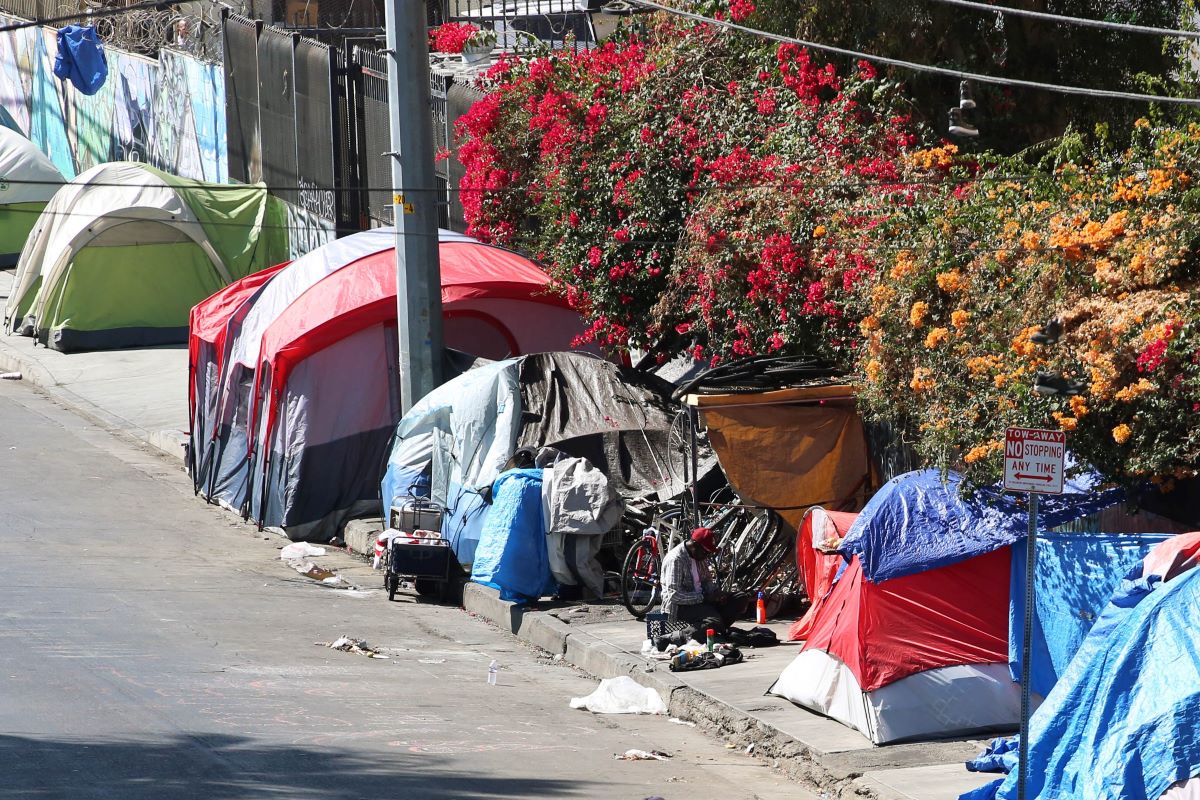This is part two in our series regarding U.S. District Judge David Carter’s recent order requiring the City of Los Angeles to offer and provide shelter to all homeless people in Skid Row’s general population by October 21. Read part one here.
U.S. District Judge David Carter’s recent order has some housing rights advocates are concerned about a potential bait-and-switch.
The order was released on the back of Mayor Eric Garcetti’s State of the City address, which called for $1 billion of next year’s budget to go toward ending homelessness. U.S. District Judge David Carter ordered that the funds be placed in an escrow account, meaning they cannot be used for another purpose.
He also offered a blistering critique of Proposition HHH, a municipal bond-funded program that Garcetti’s office said is supposed to “triple L.A.’s annual production of supportive housing and help build approximately 10,000 units for homeless Angelenos across the city,” according to the Mayor’s website.
However, the program has been beset by delays from the get-go. Carter cites a report by the LA Times from January 2020, which says the program was at least three years behind schedule and had only produced 62 units. A follow-up report from March 2021 found that just 489 units had been built, despite Garcetti’s claims that a new affordable development would be built “every three weeks.”
“With rising housing insecurity and an increasing death rate of unhoused persons on the streets of Los Angeles, never has there been so urgent of a need to utilize the Housing Element to restructure and reform the housing needs of our citizens,” Carter wrote in the 110-page legal brief.
Included in the order is a compendium of LA’s history with homelessness that Carter provides to contextualize what Garcetti described to CNN as an “unprecedented pace” that the order seeks to set.
Carter writes that homelessness began when migrant workers were drawn to agricultural work at the turn of the 20th century. The area of town they found housing options in is the same area known as Skid Row today.
Homelessness grew during the Great Depression as rampant unemployment struck the Golden State. Between the 1930s and 1960s, redlining excluded many migrants and non-whites from participating in the housing boom.
Then, during the 1970s, Republicans in Washington D.C. created the nation’s affordable housing programs: Section 8 housing vouchers and the Low Income Housing Tax Credit (LIHTC). The programs remain the most common form of funding for affordable housing developments today.
According to activists like Tracy Jeanne Rosenthal, co-founder of the LA Tenants Union, a housing rights union, these publicly-funded measures have actually accelerated the city’s homelessness issue.
Rosenthal argues in her article The Enduring Fiction of Affordable Housing that the complexity of tax incentives and the branding of “affordable housing” are the primary factors that help keep these funds from being publicly scrutinized.
At the same time, Rosenthal found no evidence that providing affordable housing lowers the risk of displacement or homelessness. She argues that “the private market cannot meet the needs of the working class and the poor” even with the use of housing subsidies.
“That contradiction means Affordable Housing helps accelerate gentrification. In poorer neighborhoods, and those where most residents are people of color, new housing that fails to serve the needs of the existing community will inevitably facilitate the influx of richer, whiter residents,” Rosenthal’s report reads.
“While boosters celebrate the long-term, citywide impact of increasing housing supply, tenants face its immediate, local consequences: an increase in property values means rising rents, landlord harassment, eviction, and the loss of community ties,” it continues.
Shortly after Carter issued his ruling, Rosenthal offered her critique.
She said the lawsuit’s goal was not to provide housing but to further expand LA’s shelter system in lieu of further criminalizing homelessness.
“Skid Row shelters will help to disappear, punish, and incarcerate rather than house the unhoused,” she said.
Yesterday, Judge Carter ruled that Los Angeles must offer shelter to every unhoused person on Skid Row.
Since Carter named me and used my research in his decision, a thread on why we must oppose this bait & switch which will criminalize our neighbors. pic.twitter.com/s2ZE202jqp
— tracy jeanne rosenthal (@two__evils) April 21, 2021
Carter devoted three pages of his ruling to analyzing Rosenthal’s article, using her argument to critique the policies that offer affordability on paper and not in practice. Rosenthal said Carter largely agrees with her that “real estate interests hide behind the brand of affordability through a policy that ultimately imperils the poor.”
However, it’s where they differed that mattered most to Rosenthal. She said that by encouraging the growth of the city’s shelter system, Carter’s order supports the same interests as the affordable programs he spends time bashing.
Shelters often provide a form of “soft incarceration,” Rosenthal said. They impose invasive surveillance requirements, unnecessary curfews, and restrictions on guests and belongings.
“I urge Judge Carter to see the same operation in the use of shelter: a temporary solution whose ultimate beneficiaries are property and business owners, not unhoused tenants in need,” Rosenthal added.
Meanwhile, research by the Los Angeles Homeless Services Authority (LAHSA) shows homelessness is expected to increase in the city. It does not have enough shelter space for the people already experiencing homelessness.
According to the latest Point in Time Count data, over 66,000 people in Los Angeles County are experiencing homelessness. That represents a 12 percent year-over-year increase. Similarly, the City of Los Angeles is home to over 41,000 homeless people, a 16 percent increase from 2020.
The city has been busy building new shelter accommodations for its homeless population as well. Some projects include a tiny home village in North Hollywood and a modular home development on Vignes Street.
However, no solution will have a long-lasting impact until housing becomes a right, Rosenthal said.
We need to defend the rights of our unhoused neighbors to refuse the terms of carceral tenancy and to use public space free from criminalization,” she added.













